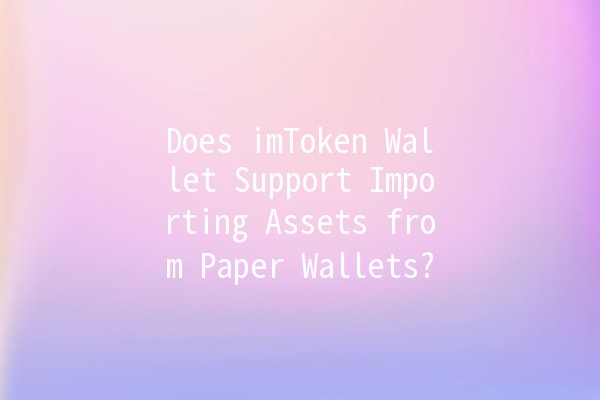In the world of cryptocurrencies, wallets serve as crucial components for storing and managing digital assets. Among the various wallets available, the imToken wallet has gained significant popularity due to its userfriendly interface and robust security features. One common question among users is whether imToken wallet supports importing assets from paper wallets. This article delves into that topic and provides practical insights regarding the benefits, methods, and security considerations of using paper wallets and the imToken wallet.

A paper wallet is a physical document containing your cryptocurrency addresses and their corresponding private keys. It is a form of cold storage, meaning that it is not connected to the internet and is less susceptible to online threats such as hacking. Users typically generate paper wallets through various online platforms, then print or write down the addresses and keys to store them securely.
The imToken wallet is known for:
One crucial functionality of any wallet is the ability to import assets from different sources. Users may find it essential to transfer assets from a paper wallet to their imToken wallet for better accessibility and management.
Security First: Never share your private key with anyone, as it grants full access to your assets.
Use a Secure Connection: Ensure you are on a safe and secure network when performing any imports or transactions.
While managing your digital assets within the imToken wallet, consider these productivityenhancing techniques:
Explanation: Keep your cryptocurrencies organized by categorizing them within the wallet. imToken allows you to create multiple wallet addresses.
Example: You can separate your longterm hold assets from your trading assets for easier tracking and management.
Explanation: Setup alerts for price points or significant market changes directly from the app to stay updated.
Example: Knowing when your favorite cryptocurrency crosses a certain price can help you decide when to buy or sell.
Explanation: Use all available security features, including setting a strong password, enabling biometric login, and regularly updating your recovery phrases.
Example: Reviewing your recovery phrases every few months can ensure you're prepared in case you need to recover your wallet.
Explanation: Stay informed about the overall market trends affecting your assets. This knowledge will help you make more informed decisions.
Example: Use imToken's newsfeed feature, if available, to keep track of significant occurrences in the crypto industry.
Explanation: Periodically check your wallet settings and transaction history to ensure everything is aligned with your expectations.
Example: If you notice suspicious transactions, you can act quickly by changing your private keys or adopting a different security measure.
Yes, as long as you have the private key stored securely elsewhere, you can recover your assets by importing it into any compatible wallet.
While paper wallets are more secure than many online wallets, they are still vulnerable to physical damage or loss. Always make several copies and store them securely.
Store your paper wallets in a physical safe, use fireproof and waterproof materials, and avoid sharing your private key with others.
It depends on your needs. If you're actively trading or using DApps, imToken offers more convenience. For longterm storage, a paper wallet may be safer.
Yes, by using the private key to import your assets, you won't lose any funds during the transfer process.
Other alternatives include hardware wallets, which offer a balance of accessibility and security without exposing private keys online.
By understanding the processes involved with importing assets from a paper wallet to the imToken wallet, users can gain better control over their digital assets. The safety measures and enhanced productivity tips mentioned can further improve user experience and ensure informed decisionmaking in the dynamic world of cryptocurrencies.